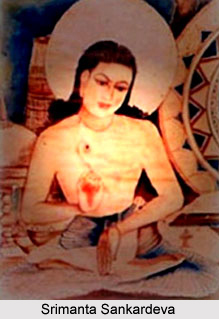 Sankaradeva (1449-1569) was born in a Bhuya family at Alipukhuri, a village on the south bank of the Brahmaputra, about sixteen miles from the present town of Nowgong.
The Bhuyas at that time were powerful feudal lords, enjoying social privileges granted by the king. Sankara`s family was called the Siromani Bhuya, being the chief among the
Bhuyas. His father was Kusumbara. Sankara`s mother died within three days of his birth, and he was brought up by his grand-mother, Khersuti. When Sankara was twelve years old he was sent to a village school maintained by Mahendra Kandali, an erudite Sanskrit scholar.
Sankaradeva (1449-1569) was born in a Bhuya family at Alipukhuri, a village on the south bank of the Brahmaputra, about sixteen miles from the present town of Nowgong.
The Bhuyas at that time were powerful feudal lords, enjoying social privileges granted by the king. Sankara`s family was called the Siromani Bhuya, being the chief among the
Bhuyas. His father was Kusumbara. Sankara`s mother died within three days of his birth, and he was brought up by his grand-mother, Khersuti. When Sankara was twelve years old he was sent to a village school maintained by Mahendra Kandali, an erudite Sanskrit scholar.
Sankara completed his studies at the age of twenty-two and emerged a full-fledged scholar. Soon after he left school heavy domestic responsibilities fell upon his young shoulders. He was married to Suryavati, a Kayastha bride. Suryavati died four years after her marriage, leaving an infant daughter. About the same time Sankara lost his father. These two bereavements filled his youthful mind with overwhelming sorrow and he thought of renouncing the world. After per-forming his daughter`s marriage, Sankara set out on a long and arduous pilgrimage (A.D. 1491.) He was accompanied by seventeen companions including his teacher Mahendra Kan-Dali. A detailed account of this pilgrimage has been recorded in the biographies of Sankaradeva compiled by his disciples. He visited most of the sacred places and temples of northern and southern India. Among the sacred places and shrines that he visited were Gaya, Puri, Vrindavana.
Mathura Srimanta Sankardeva (1449-1568) with great endeavour had tried to spread the Vaishnava faith among the people as well as decrease the religious attitude of people. He was born into the Shiromani Baro-Bhuyans family in a village called Ali-pukhuri. The Vaishnava faith that was initiated by him is known as ekasarana dharma or devotion to one Supreme God. He was a multi faceted personality. He was a poet and a religious reformer too. He was a renowned Sanskrit scholar. This is evident from Bhakti Ratnakara which is a discourse on Sanskrit Vaishnavism. Its cardinal features are: Sravana kirtana dharma: it is a principle of audition that was accepted as an inspiring device for religious devotion, the view that the relation of man to God was like that of a servant to his sovereign.
Sankardeva in order to propagate his religious doctrines began composing literary works, poems and dramas. He had translated Bhagavatam. This was the starting point of enthusiasm and inspiration for Assamese literature. His intelligence is evident in the poem Harischandra upakhyana which was composed when he was in his teens. The poetical work that has given Sankardeva great fame is the Kiriana that contains 26 poems and 2,261 couplets. He is noted for clear and chiseled phrasing. The Sisulila and the Adi Dasama also contain captivating portraits of Lord Krishna`s childhood. This also revealed in his Bargeetas and Ankargeetas. He laid the foundation of mysticism in Assamese literature with his Bargeetas and Ankargeetas.
His Rukminiharana kavya, inspired by Bhagavatam and the Harivamsa, is a long narrative poem written with touches of local colour and life. His dramas are interspersed with beautiful songs. Nature has been a major part of his poems. This is seen in his poems like Haramohan, Trikuta varnan, Rasa krida. He believed in the power of literary art.
Srimanta Shankardeva is credited with providing a thread of unity to Ahom and Koch kingdoms of Assam. He inspired Bhakti in Assam. The Sattras established by him continue to flourish. His Poetic works are: Kirtana-ghosha, Harischandra-upakhyana, Rukmini-harana, Ajamilopakhyana, Bali-chalana, Kurukshetra-yatra, Gopi-uddhava-samvada, Amrta-manthana, Krishna-prayana-pandava-niryana and Kamajaya.
His works in drama include: Cihna Yatra, Patni-prasada, Kalia-damana, Keli-gopala, Rukmini-harana, Parijata-harana and Srirama-vijaya.













